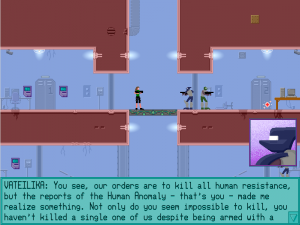Difference between revisions of "Empathy in Gaming"
(→Multiplayer Interactions) |
|||
| Line 77: | Line 77: | ||
===Trust=== | ===Trust=== | ||
| + | |||
| + | [[File:Trust in agario.gif|thumbnail|$$TRUSTME$$ feeds Dango enough mass to kill (-_-) but is betrayed immediately afterward.]] | ||
==Empathy games== | ==Empathy games== | ||
Revision as of 15:38, 15 March 2017
Empathy in gaming is a topic of ongoing discussion about both real and simulated behaviors required and encouraged in video games. As early as the 1970s, concerns have been raised about violent content and the example it sets.[1] Simultaneously, player-directed stories and narrative-driven games indicate a potential for greater emotional engagement.[2] Practical implications of such influences are inconclusive, with multiplayer games often rewarding both cooperative and griefing behaviors.[3][4]
Contents
Background
For as long as violence has been present in games, questions have been raised about the influence such content may have on its audience, how accessibility can be limited, and whether extreme content should be censored altogether.
Death Race Controversy
In 1976, the arcade game Death Race fell under criticism due to the objective of the game being to run over pedestrians who emitted high-pitched screams upon being hit.[1] Dr. Gerald Dreissen, then-manager of the National Safety Council's research department for Family Safety Magazine, remarked, "I shudder to think of what will be next if this one is not defeated by public opinion." Following the controversy, a Chicago retailer halted distribution of the game.
Creation of the Entertainment Software Rating Board
In 1993, Mortal Kombat was released. The game received negative attention due to its extreme violence, which included characters beheading or ripping the heart out of their opponent. Footage was brought to the Washington press to open a dialogue on violence in video games. [5] Immediately following, Senator Joe Lieberman held a subcommittee on the issue, leading to the creation of the Entertainment Software Rating Board, whose purpose was to enforce age restrictions based on mature content.
Doom Controversy Following Columbine Massacre
Shortly following the Columbine High School massacre in 1999, it was discovered that shooter Eric Harris was an avid player of the first-person shooter Doom, a game known for excessive blood and violence. Though rumors arose of Harris creating custom maps to imitate sections of the school, these were later dismissed. [6][7] This, however, did not mitigate concerns about the influence of simulated violence.
Violence as a theme
Spec Ops: The Line
Spec Ops: The Line is a third-person shooter that narrates a rescue mission gone awry. In it, the protagonist Walker confronts the defected 33rd Brigade and spends a majority of the time fighting other American soldiers. At the same time, the player character is also forced into confrontations with angry civilians who don't distinguish the player's team from the brigade. Moral issues arise as Walker reluctantly kills the same people he was sent to rescue. At one of the plot's turning points, Walker orders the mortar shell of white phosphorus to be fired, intending to defeat the 33rd Brigade. Afterward, Walker and his team walk through the area affected by the blast zone only to discover they had inadvertently fired on civilians.[8][9]
Call of Duty: Modern Warfare 2
Modern Warfare 2 received media attention when footage of the mission No Russian was leaked depicting CIA operatives opening fire on civilians.[10] In-game, the player's objective is to carry out a terrorist attack in order to gain the trust of a Russian terrorist organization. Following the game's release, conflicting opinions arose, with objections of the mission's disturbing imagery, criticism of the mission as shock value, and praise of the morally weighted choice of whether or not the player decides to participate in the massacre.[11][12][13]
Richard Pearsey, co-writer of Spec Ops: The Line, writes about the context of No Russian:
- People are not going to get mad at you ... if what you do is consistent with the game world. If what happens ... if the shocking moment is adequately prepared ... for you to understand that this type of game that you bought into, it's going to get progressively worse and we're going to talk about whether or not your actions are appropriate or not... I think it has to be consistent... I don't want to be critical of another game but the [airport] scene in Modern Warfare ... people were pissed off about that. It took you out of the game and jarred you, because it doesn't fit that game world. And not only does it not fit that game world, you don't get to react like the characters you were playing would... You need to allow them to feel like they have some moral agency in a situation like that.
Violence as a voluntary mechanic
Iji
The side-scrolling shooter Iji utilizes the player's kill count as a mechanic for directing the story. Following an alien invasion, the protagonist is confronted by an alien species under strict orders to kill on sight. Depending on whether or not the player chooses to kill the aliens, the player character may form alliances with factions of the invading army or be feared as a genocidal killer.[14]
Undertale
Main article: Undertale
The RPG Undertale has a central theme of morality and puts the player in a position of power over benevolent characters. The protagonist's relationship with those around them varies depending on how they interact in random encounters. Battle sequences present the player with an Act button, giving them non-violent options for diffusing a fight. [15]
Portrayal of mental illness
Outlast
Outlast is a horror game set in an asylum. The player assumes the role of an journalist investigating a psychiatric hospital after allegations of patients being victim to human experimentation. In-game enemies are primarily hospital patients, and while the player is not given the option of harming them, they are universally portrayed as unpredictable and violent, with the player having little option other than to run from them on sight.[16]
In response to the game's content, player Albert C. Thrower voiced his concerns: "Again, I'm fine with a horror game where the antagonists are asylum patients. Just like I'm fine with a game where the antagonists are all men, or women, or white folks or black folks or Québécois or whatever. Within the context of a story that sort of thing can make sense and be compelling. But outside of that context, to make statements that suppose we should be scared of mentally ill folks perpetuates unfounded and harmful stigmas." [17]
Neverending Nightmares
Neverending Nightmares is a horror game developed by Infinitap games. Its director, Matt Gilgenbach, based much of the game's mood and imagery on his own experience with OCD and depression. When interviewed, he mentioned "I suffered very badly from 2001-2003, and everything felt completely bleak and hopeless... It was so hard to just walk around and do the everyday tasks like get out of bed and go to classes. I am trying to create that feeling in Neverending Nightmares."[18]
Heavy Rain
Portrayal of racism
Ethnic Cleansing
Final Fantasy X
https://www.youtube.com/watch?v=SxOZmnIZ-O0
Cooperative Multiplayer
Trust
Empathy games
A number of games have been created with the specific purpose of evoking empathy from their audience.[2] For instance, Coming Out Simulator 2014 is an interactive narrative in which the player is made to argue with the protagonist's homophobic parents. [19] Its creator, Nicky Case, spoke about his success in expanding the perspective of its players, stating "The weirdest compliment I ever got for Coming Out Simulator 2014 was 'Even though I don't like gays, I really liked your game!' And I was like, uh, thanks? Because that was the best-case scenario, to get someone who's opposed to homosexuality to, for a few brief moments, see it from [the other] side."
Unused Sources
Single Player
- Ethical decisions
Manhunt (rewarding brutal kills)
- Guilt
The Witch's House
https://www.destructoid.com/do-the-wrong-thing-breaking-sasha-s-promise-155210.phtml
Multiplayer
- Nonverbal Communication
https://www.youtube.com/watch?v=dFjWikDX12U
https://en.wikipedia.org/wiki/Chicken_(game)
http://thatgamecompany.com/games/journey/
- Scarcity
http://www.gamefaqs.com/webonly/929134-kingdom-of-loathing/reviews/102052
https://en.wikipedia.org/wiki/Monster_Hunter
- Trust
- Anonymity and accountability
https://www.youtube.com/watch?v=RqGnkfDhmtQ
https://www.youtube.com/watch?v=KsV_Kmp9T3w
References
(For editor's reference, assume date of access for all references is February 19, 2017. Use archive.org to substitute modified pages where appropriate.)
- ↑ 1.0 1.1 Local safety authorities denounce game
- ↑ 2.0 2.1 Immersive Narrative and Storytelling in Video Games
- ↑ "Griefer" Player Culture
- ↑ Professor Shows Cooperative Video Game Play Elicits Pro-Social Behavior
- ↑ Mortal Kombat: Violent game that changed video games industry
- ↑ Did Harris preview massacre on 'Doom?'
- ↑ Columbine Doom Levels
- ↑ Don't Be a Hero: The Fully Story Behind Spec-Ops: The Line
- ↑ Spec Ops: The Line Game Movie
- ↑ [http://www.gamespot.com/articles/modern-warfare-2-massacre-not-representative-of-overall-experience-activision/1100-6238331/ Modern Warfare 2 Massacre Not Representative of Overall Experience]
- ↑ Religious Leaders Slam Modern Warfare 2
- ↑ About That Level
- ↑ Why I Support Modern Warfare 2
- ↑ Review: Iji
- ↑ Player Morality in Undertale
- ↑ Portrayal of Mental Illness in Video Games
- ↑ Stigmatizing Mental Illness in Video Game Marketing: A Letter
- ↑ Neverending Nightmares: How OCD Inspired a Psychological Horror Breakthrough
- ↑ Coming Out Simulator




